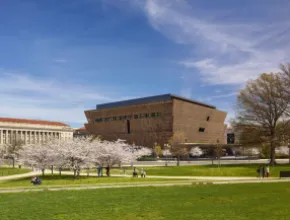This year marks the 50th anniversary of Vermont’s State Billboard Act, spearheaded by late state lawmaker Ted Riehle. Opposed by farmers and advertisers then profiting from roadside messaging, Riehle correctly saw far greater value in preserving Vermont’s natural beauty.
Enacted in 1968, the law forever prohibits promotional signage on Vermont’s roadways. In so doing, Riehle effectively forever “greened” the state’s brand, vitally supporting the state’s nearly $2.5 billion tourism economy.
Maine followed suit in the early 1980s, with Hawaii (1920s) and Alaska (1998) rounding out the only four U.S. states with anti-billboard laws. While New Hampshire allows outdoor advertising, it shares its neighbors’ focus on environmental stewardship.
For groups, sustainability in this New England trio comes in many shades of green—inspiration included.
Valuable Resources
In 2000, Maine became the third state in the nation to establish an Environmental Leader certification program.
Created by the Maine Department of Environmental Protection, participating restaurants, hotels and grocery stores self-certify measures in five areas: reducing energy, conserving water, minimizing waste, using environmentally preferable cleaners and educating customers on reducing environmental impact.
Certified group hotels include the luxurious 61-room Inn by the Sea on historic Cape Elizabeth near Portland, Maine. Nationally recognized for its green practices, this LEED Silver-certified oceanfront gem flexibly hosts up to 150 guests for indoor meetings and outdoor events.
Along with several national brands, other members include the Bar Harbor Grand Hotel; Grand Summit Resort Hotel at the Sunday River ski resort; and Sugarloaf Mountain Hotel at Sugarloaf Mountain Resort. Accommodating groups of 20 to 150, the Meadowmere Resort in Ogunquit on the Southern Maine Coast has gained significant acclaim for its eco-friendly practices, regular eco-tours included.
On the F&B front, Allagash Brewing Company in Portland has proudly crafted a winning sustainability plan along with its acclaimed Belgian-inspired brews.
Offering daily free tours and tastings, Allagash’s green initiatives include rooftop solar panels, near-total landfill diversion, high-efficiency boilers and local sourcing of ingredients.
The company also offers community give-back, including donations to charity partners, volunteer projects like local trail cleanup, and environmental protection initiatives.
Portland—Maine’s most-visited city—continues to make significant strides in sustainability.
Tourism-facing initiatives include restoring Casco Bay’s waters for recreational use and promoting the city’s bike- and pedestrian-friendly culture.
The 226-room Portland Marriott at Sable Oaks is another Certified Environmental Leader. Offering 12,330 square feet of space, including the 900-capacity Grand Ballroom, the hotel was an early partner with Portland-based food waste recycling enterprise Agri-Cycle.
The company recognizes the hotel’s executive chef, Chris Merriam, and his staff for “their leadership in food waste recycling and other sustainability initiatives [that] has been a model for hotels throughout Maine and the region.”
In coastal Rockland, groups can charter the carbon-free schooner J. & E. Riggin, the first Maine windjammer to be awarded the Maine DEP Environmental leadership award in hospitality, for eco-friendly sailing adventures.
Free Time
Written by Revolutionary War hero General John Stark in 1809 and adopted by the legislature in 1945 as World War II ended, New Hampshire’s “Live Free or Die” is among America’s best known state mottos.
Encircling the equally renowned Old Man of the Mountain (inspired by the rocky visage seen in Cannon Mountain of the White Mountains), these rousing words speak to the spirit of Granite State meetings.
Crowned by its namesake mountain, southwestern New Hampshire’s 40-town Monadnock Region is a place to breathe free. Promoting walkable neighborhoods nationwide, the website Walk Score calls Keene, where green space figured prominently in the city’s post-industrial redevelopment, a “Walkers Paradise.”
For groups, that means car-free access to abundant conferencing and event resources, including the Colonial Theatre, Redfern Arts Center and Courtyard Keene Downtown.
In coastal Portsmouth, the grand 161-room Wentworth by the Sea, A Marriott Hotel & Spa, offers 10,000 square feet of space, including three ballrooms and prefunction space with soul-lifting ocean views. Practicing Marriott International’s Green Meetings standards, the Energy Star-certified property’s eco-friendly measures include low-flow plumbing, energy-efficient lighting and comprehensive recycling.
Threaded with scenic byways, hiking trails and legendary peaks, New Hampshire’s legendary White Mountains are a place to free mind, body and soul.
Most spectacular are the 13 mountains of the Presidential Range, crowned by 6,288-foot Mount Washington. Groups can ride the famed Cog Railway or tour the Northeast’s highest peak with eco-friendly Mt. Washington Auto Road tours, including extreme SnowCoach excursions in winter.
For meetings and wide-ranging outdoor activities, Mount Washington Resort hotels include the National Historic Landmark 200-room Omni Mount Washington Resort, offering 30,000 square feet of space.
Sustainability programs include participation in Say Goodnight to Hunger, Omni’s partnership with Feeding America, which donates one meal for each group room booked.
Renewed Energy
In 2015, Burlington, Vermont’s largest city, became the first in the U.S. to fully utilize renewable sources, including biomass, hydroelectric, solar and wind for its electricity.
Recognized by the United Nations as a Model of Sustainability, it’s part of Vermont’s quest to become the nation’s first green-energy economy. The progress is not without challenges—for example, how to deploy solar fields without the “billboard” effect?
Bright minds on the case include teams at the University of Vermont, where groups of up to 2,500 can rent facilities year-round throughout the main Burlington campus.
These include the Davis Center, with two ballrooms for up to 700 attendees, and George D. Aiken Center, which houses the LEED Platinum-certified Rubenstein School of Environment and Natural Resources and is ideal for presentations and breakouts.
Dedicated to “educating for a sustainable future,” Shelburne Farms is an idyllic seasonal option on the shores of Lake Champlain just south of Burlington.
With private meeting and dining space for 28, the 24-room National Historic Landmark Inn at Shelburne Farms is complemented by guest houses and cottages.
Groups can ramble the property’s 1,400-acre working farm and forested areas. Tours, special events and educational programs include Sun to Cheese, celebrating Shelburne’s award-winning farmhouse cheddar; Raptors in Residence; and returning this July, Farm to Ballet, uniquely depicting Vermont farm life through reinterpreted classical ballet.
Since 1910, the Green Mountain Club has maintained Vermont’s Long Trail, or “footpath in the wilderness,” and sections of the Appalachian and Northeast Kingdom trails.
Accommodating groups of 120, the Club’s timber-frame hall in Waterbury Center, producing its own energy, comes with media systems, caterer-ready breakroom and outdoor picnic tables.
Set on 86 acres with mountain views, nearby Moose Meadow Lodge & Treehouse is an exquisite small meetings choice. The luxurious Adirondack-style log cabin, hand-crafted by co-proprietor Greg Trulson using all-natural materials, sleeps eight, plus two in the two-story Treehouse. Overnight guests can also camp at the Sky Loft, a 12-sided, glass-walled gazebo at the property’s summit.
“From living room breakouts to outdoor gatherings by the pond, we provide plenty of room to think and create,” said innkeeper Willie Docto, a professional violinist and former meeting planner.
Sustainable local ingredients nourish the menu at perennial group favorite The Essex, Vermont’s Culinary Resort & Spa, in Essex Junction.
From energy-efficient snow guns to extensive reuse and recycling programs, Vermont’s group-capable ski resorts prioritize sustainability.
Examples include Stowe Mountain Resort’s “Epic Promise for a Zero Footprint” initiative, aiming for zero net emissions, zero waste to landfill and zero operating impact to forests and habitat by 2030.
CVB Contact Information
MAINE
Bar Harbor COC
207.288.5103
Greater Bangor CVB
207.947.5205
Kennebec Valley COC
207.623.4559
Maine Office of Tourism
888.624.6345
Visit Portland
207.772.5800
NEW HAMPSHIRE
Greater Manchester COC
603.792.4100
Mount Washington Valley COC & Visitors Bureau
603.356.5701
New Hampshire Division of Travel and Tourism Development
603.271.2665
White Mountains Visitor Center
603.745.8720
VERMONT
Vermont Convention Bureau
802.860.0606







